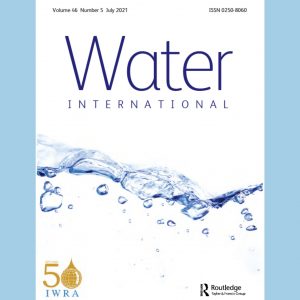The absence of U.S. governmental support for securing freshwater has been especially difficult for the country’s disadvantaged communitiesIt is simply unfathomable that in 2021, the United States, one of the wealthiest nations on the planet, cannot take care of its ownWhat is needed today is a new priority focused on water justice, a priority that places sustainable water access for all Americans
As the world celebrates again the most important day for water, this year’s theme seems especially relevant and timely for President Joe Biden’s administration. ‘Valuing Water’ should be the administration’s motto for addressing on-going water challenges throughout the United States. By grasping the real value of water for its citizens, making sustainable water access a nationwide priority, and protecting this vital resource for the many American generations yet to come, Biden’s administration has a unique opportunity to embrace water justice for the entire country. President Biden can do this by supporting the recently proposed Water Affordability, Transparency, Equity, and Reliability (WATER) Act.
During the last days of the Obama administration, the US Environmental Protection Agency’s Office of Water recognised growing challenges to achieving and sustaining safe drinking water in the United States. Among others, it highlighted concerns over aging infrastructure, inconsistent knowledge and capacities among municipalities (especially smaller and disadvantaged communities), degraded freshwater sources and threats from unregulated contaminants, and hazards associated with climate and extreme weather events. Given that water was never prioritized under the Trump administration, these conditions have worsened and threaten to constrain the hoped-for economic recovery in the wake of the COVID-19 pandemic. Thus, it is no surprise that in its latest national review of the country’s water infrastructure, the American Society of Civil Engineers awarded the United States a grade of “D” for its drinking water systems and a “D+” for its wastewater infrastructure.
In Texas, for example, following an unprecedented snowstorm last month, it became clear that the state was ill-prepared to deliver safe freshwater to its residents in the face of growing climate uncertainty. From frozen and burst pipes to boil water notices, urgent and emotional pleas for basic services were echoed broadly by millions of desperate Texans, some of who lacked clean water for more than two weeks.
The absence of U.S. governmental support for securing freshwater has been especially difficult for the country’s disadvantaged communities—low-income households, people of color, and Native Americans—who are between 2 to 19 times more likely to lack access to safe water and sanitation in their homes as compared to their white counterparts. These groups are also disproportionately affected by rising water bills; over the past decade, the combined costs of water and sewage have increased by an average of 80%. And it is no coincidence that the communities with the highest coronavirus infection rates are the same ones suffering from inadequate water supplies.
What is worse is that some American communities seem to have been completely forgotten. In Philadelphia, in low-income black and brown neighborhoods, some residents have functioned without freshwater for decades and are forced to use plastic bags as toilets and bottled water for handwashing. In Sandbranch, an unincorporated primarily African-American community just outside of Dallas, the fifth wealthiest city in the United States, the entire population has lived without clean water and sewage services for more than 30 years, even though they are located approximately 50 feet from one of Dallas’ high-tech, state-of-the-art water-treatment facilities.
It is simply unfathomable that in 2021, the United States, one of the wealthiest nations on the planet, cannot take care of its own. It is equally inexplicable how this advanced technological country allows one of the most critical components of life on Earth to be contaminated, depleted, and squandered in the face of degradation, overexploitation, population growth, and climate change.
What is needed today is a new priority focused on water justice, a priority that places sustainable water access for all Americans and protects the country’s vital water resource. On 25th February 2021, the Water Affordability, Transparency, Equity, and Reliability (WATER) Act of 2021 was reintroduced in the U.S. House of Representatives. Responding to the numerous water-related problems afflicting the country, the Water Act “establishes increased yearly mandatory spending” of nearly $35 billion per year to upgrade and protect drinking water and clean water infrastructure, thereby reversing decades of federal funding decline, 77% in real terms since 1977. In particular, the Water Act includes programs that specifically direct resources and support for disadvantaged communities and those facing disproportionate water challenges. Moreover, in addition to improving water access nationwide, protecting freshwater supplies, and improving public water systems to remove toxins and hazardous chemicals like lead and PFAS, the Water Act also creates as many as one million jobs throughout the economy.
President Biden has already pledged to “advance racial equity and support underserved communities.” He also promised that low-income and communities of color would receive as much as 40% of the benefits of his $2 trillion climate plan. While critically needed and welcomed initiatives, these programs must be paired with a justice and equity program focused on water, the singular substance that underpins our entire economy, agricultural activity, and all life itself. The true value of water is simply immeasurable. Without a sustainable source of clean water, food and energy cannot be produced, animals and habitats cannot endure, and humanity cannot exist.
By supporting the Water Act, President Biden and his administration will trigger significant changes that will reverberate in America’s future for decades. Embracing the Water Act will mean embracing water justice, both as an ethos and a pragmatic plan to implement equitable access to clean water and sanitation nationwide. It will set a course that will nurture the economy, create jobs, and ensure a more robust post-pandemic recovery.
In addition, support for the Water Act will necessarily mean reinvigorating and prioritizing the science-policy interface, which was discarded by the prior administration. A science-based approach will help implement programs and research designed to achieve the Water Act’s objectives, as well as policy goals that encourage the development of science and technology in ways that support the nation’s priorities and aspirations.
Water is fundamental for all peoples and societies. It is a bonding agent that brings communities together, a fuel for economic development, and the source of life as we know it. Valuing and safeguarding water has never been more critical for the United States.
To value water is to value people.
by IWRA’s Presindent, Gabriel Eckstein
Read also this article on the Water Science Policy website.





